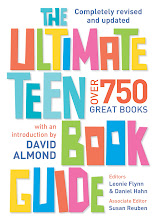 This is a brilliant yet shocking book that makes you question everything you know about humanity. When a normal fifteen-year-old boy goes to Pakistan his father goes missing, and on his own initiative he goes out to find him - and his search takes him through an al-Qaeda demonstration. After a whole day searching in a city unknown to him he goes back to the house where a group of Americans come and take him prisoner. He is taken to the Guantanamo Bay detention centre simply because he has dark skin, and he loses faith in the world.
This is a brilliant yet shocking book that makes you question everything you know about humanity. When a normal fifteen-year-old boy goes to Pakistan his father goes missing, and on his own initiative he goes out to find him - and his search takes him through an al-Qaeda demonstration. After a whole day searching in a city unknown to him he goes back to the house where a group of Americans come and take him prisoner. He is taken to the Guantanamo Bay detention centre simply because he has dark skin, and he loses faith in the world.Based on a true story this book raises an issue that everyone knows about but is afraid to discuss. Guantanamo Bay, where people are kept without any legal reason, is an appalling place where the inmates are humiliated and tortured – by a supposedly humane Western government. If you read this book be ready to stay up to the early morning, and be prepared to cry.
Recommended by Jonah Freud, age 12
Next?
- If you’re interested in what it’s like to be imprisoned, try Matt Whyman’s Inside the Cage, which is about a boy suspected of hacking into Fort Knox and who ends up in an American secure prison in the Arctic. Or try Big Mouth and Ugly Girl by Joyce Carol Oates, which is about the effects of false imprisonment on a teenage boy.
- Or there’s a new series about a boy sent to the harshest of all juvenile detention centres; The Furnace Penitentiary. The series looks interesting; the first one, Furnace: Lockdown, comes out in March.
- Or if you want to think about what the colour of our skin might mean, try Malorie Blackman’s Noughts and Crosses. The whole series is wonderful, but particularly of interest might be Checkmate, which is about what turns someone into a suicide bomber.
.jpg)


2 comments:
I have finally finished it! I must say it was hard-work, and I am not sure why. I struggled until he got to Guantanamo Bay. But it is a great read, a very "useful" read. You think you know all the horrible things that have happened there and yet Anna Perera still manages to shake you quite a bit.
She wrote a really interesting article for the Waterstones Magazine; did you see it?
Post a Comment